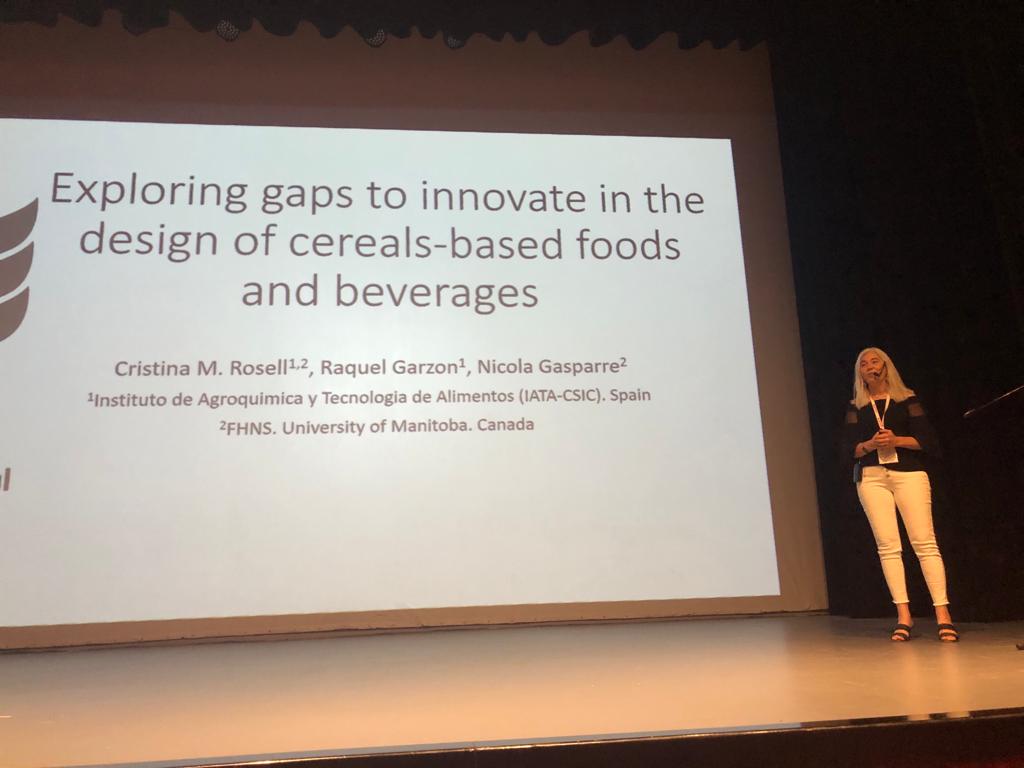IATA presented a new research paper
Cristina M. Rosell, from IATA, participated in the III International Congress on Cereals, Legumes, and Related Topics held in Quito, Ecuador, from June 14 to 16, 2023. Cristina M. Rosell, along with co-authors Raquel Garzon and Nicola Gasparre, presented a research paper titled "Exploring gaps to innovate in the design of cereals-based foods and beverages."
Exploring gaps to innovate in the design of cereals-based foods and beverages
Cristina M. Rosell1,2, Raquel Garzon1 and Nicola Gasparre2
1Instituto de Agroquimica y Tecnologia de Alimentos, Paterna, Spain.
2 Department of Food and Human Nutritional Sciences. University of Manitoba, Winnipeg, Canada.
Email: This email address is being protected from spambots. You need JavaScript enabled to view it., This email address is being protected from spambots. You need JavaScript enabled to view it.
Abstract
Health and sustainability are the dominating trends governing the foods and beverages market. Every year thousands of new foods are launched fulfilling innovation with the inclusion of non-conventional raw materials and applying alternative processes that could be more environmentally friendly. How science might contribute to obtain healthy and sustainable foods and beverages, particularly in the case of cereals and grains based ones?. In this scenario, becomes very important to know what is present in the market to identify the gaps, and to improve the existing foods and beverages. The market understanding could be a fundamental tool to define the appropriate research. To evidence that paradigm, presentation would cover the research carried out in the frame of two European projects (TraceRice and FlatBreadMine) funded by PRIMA program-Horizon 2020, focussed on rice and breads, respectively. Rice is a staple commodity in many countries, and mainly consumed as polished rice, but many other foods are developed including gluten free bakery products, non-dairy beverages, and so on. In fact, a market analysis shows the steady increase of the use of rice in different products, which could be benefited from inherent nutritional features of rice or those acquired during processing. Examples of those would be provided considering rice bran properties and sushi making process.
Other important trend has been the gluten free foods, responding to dietary restrictions or to personal dietary habits. In pursuing that trend, bakery products are dramatically affected due to the leading role of gluten in the breadmaking process, particularly those that largely require viscoelastic properties, such as flat breads. FlatBreadMine project is responding to the challenge of obtaining gluten free flat breads. By utilizing non-conventional raw materials, exploring innovative processing techniques, and utilizing agri-food by-products, researchers can maximize the nutritional value of foods while minimizing waste and environmental impact. The scientific basis behind those innovative developments will be discussed.
In summary, science contributes to obtaining healthy and sustainable foods and beverages by driving innovation, exploring the potential of non-conventional raw materials, optimizing processing techniques, and leveraging market understanding. Projects like TraceRice and FlatBreadMine exemplify how scientific research can lead to the development of nutritious and environmentally friendly food options, meeting the dual goals of health and sustainability.
Keywords: wheat, rice, bread, bran, health, sustainability, processing, digestibility, PRIMA projects.


